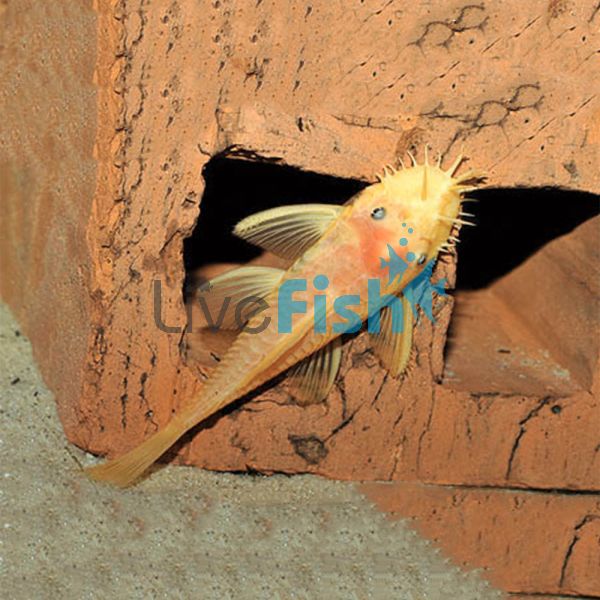Albino Bristlenose Catfish 3cm
The Albino strain develops a rich gold colour as it grows. Originally collected from the rivers of the Amazon region and get their name from the whiskers that develop on the Males;
It seems like there is an almost endless range of bristlenose pleco variations which is simply due to breeders finding genetic flukes in these fish that result in an awesome-looking fish. With how easily these fish breed, bristlenose plecos have become a collector’s species for home breeders to try out. One of the most classic and original variations is the albino bristlenose. The albino bristlenose plecos are also a great algae eater and will be a vital member of your clean-up crew which makes them an even better fish to have in your aquarium.
- Buy 4 for $16.23 each and save 10%
- Buy 8 for $14.42 each and save 20%
Albino Bristlenose Pleco
It seems like there is an almost endless range of bristlenose pleco variations which is simply due to breeders finding genetic flukes in these fish that result in an awesome-looking fish. With how easily these fish breed, bristlenose plecos have become a collector’s species for home breeders to try out. One of the most classic and original variations is the albino bristlenose. The albino bristlenose plecos are also a great algae eater and will be a vital member of your clean-up crew which makes them an even better fish to have in your aquarium.
Albino bristlenose plecos were one of the first variations of the common bristlenose which is a near black colour. As these fish have the albino gene, they lack the dark pigment cells which results them in having a near-white colour. The main body colouration can range between a cream white to a light orange colour. Any spots across the body and fins will tend to be pure white which creates a surprisingly visible leopard patterning. These fish are super easy to spot in the aquarium because of their bright colours, they also can be bred with common dark bristlenose to create a really cool chocolate coloured pleco.
These fish can easily be kept in a species-only breeding tank with minimal effort which makes them great entry-level breeding fish or for an aquarist looking to run a system on a budget. Trying to find the males and females in this species is fairly easy. Males have a lot of fleshy bristles all over their noses which can look pretty weird but that’s what makes them such a unique species. Females on the other hand have little to no bristles.
Tank Recommendations for your Albino Bristlenose Pleco
A group of albino pleco can easily be kept in an aquarium with a minimum volume of 75 litres, this would also be the minimum volume for a single fish. These fish tend to max out at around 10-15 cm and will have little to no concern with the aquarium setting as long as they have places to hide. They can be kept with virtually any substrate and hardscape, are very plant-friendly and once settled into the aquarium, they should spend some time out in the open.
Suitable Tank Buddies
The albino bristlenose pleco is extremely peaceful minimal aggression coming out between males during breeding time however this is kept between the males and never affects any other tank mates. The only consideration is to avoid any fin-nipping tank mates as these will for sure pester the long fin plecos.
Usually Compatible
Tetras, gouramis, corydoras, angelfish, rams, and other common community fish.
Sometime Compatible
Semi-aggressive or territorial cichlids like jack Dempseys, fire mouths, or convict cichlids. Rosy barbs, tiger barbs, and similar fin-nipping fish should be avoided or kept with caution.
Rarely Compatible
With large aggressive species such as African cichlids, Oscars, and Jaguar cichlids. These species may try to eat the Bristlenose pleco which could end in death for both fish. These plecos have dense armour-like bones and pectoral spines which can get lodged in the throat of these fish.
Feeding your Albino Bristlenose Pleco
Albino Bristlenose plecos will easily take to a wide range of food and are arguably one of the easiest fish to feed. The Bristlenose are regarded as ‘wood eaters’ meaning they can easily sustain themselves eating aquarium driftwood. The best type of wood is Malaysian bog wood as this is a softer type and breaks down fairly easily.
Do keep in mind that plecos feeding exclusively on wood can lead to a lot of wood dust as a byproduct due to them chomping away however a palm-sized piece of wood should last a very long time. Aside from this they will eat algae and decaying plant matter but will also eat sinking aquarium foods like sinking pleco wafers. This can be supplemented with blanched veggies like zucchini and pumpkin.
| Scientific Name | Ancistrus species |
|---|---|
| Care Level | Easy |
| Common Names | Common Names Bristlenose, cleaning catfish, bushy nose pleco, ancistrus pleco, bristlenose pleco |
| Diet | Omnivore |
| Fish Family | Loricariidae |
| Lifespan (years) | 15 |
| Max. Length (cm) | 15 |
| Min. Tank Volume (l) | 75 Litres |
| Origin | South America |
| Reef Safe | Yes |
| Sociability | Peaceful |
| Venomous | No |
| Water Conditions | 24-28° C (75-79° F), pH 5.0-7.0 |




